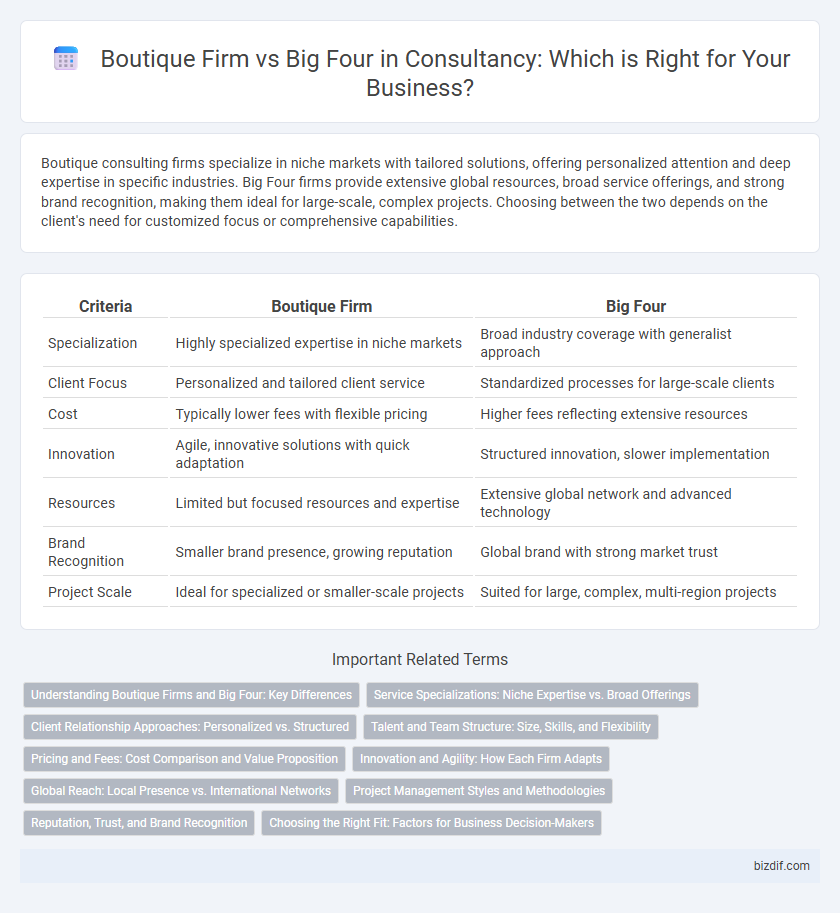Boutique consulting firms specialize in niche markets with tailored solutions, offering personalized attention and deep expertise in specific industries. Big Four firms provide extensive global resources, broad service offerings, and strong brand recognition, making them ideal for large-scale, complex projects. Choosing between the two depends on the client's need for customized focus or comprehensive capabilities.
Table of Comparison
| Criteria | Boutique Firm | Big Four |
|---|---|---|
| Specialization | Highly specialized expertise in niche markets | Broad industry coverage with generalist approach |
| Client Focus | Personalized and tailored client service | Standardized processes for large-scale clients |
| Cost | Typically lower fees with flexible pricing | Higher fees reflecting extensive resources |
| Innovation | Agile, innovative solutions with quick adaptation | Structured innovation, slower implementation |
| Resources | Limited but focused resources and expertise | Extensive global network and advanced technology |
| Brand Recognition | Smaller brand presence, growing reputation | Global brand with strong market trust |
| Project Scale | Ideal for specialized or smaller-scale projects | Suited for large, complex, multi-region projects |
Understanding Boutique Firms and Big Four: Key Differences
Boutique consulting firms specialize in niche industries or specific consulting services, offering personalized, agile solutions with deep domain expertise and closer client relationships. Big Four firms--Deloitte, PwC, EY, and KPMG--provide extensive global reach, broad service portfolios, and large-scale resources, enabling comprehensive, standardized consulting solutions across diverse sectors. The key differences lie in boutique firms' customized, flexible approach versus the Big Four's expansive, structured methodologies and brand reputation.
Service Specializations: Niche Expertise vs. Broad Offerings
Boutique consulting firms excel in providing niche expertise tailored to specific industries or specialized functions, allowing for deep knowledge and customized solutions that address unique client challenges. In contrast, Big Four firms offer broad service offerings spanning audit, tax, advisory, and consulting, delivering integrated solutions suitable for large, complex organizations with diverse needs. Clients seeking highly specialized, innovative strategies often prefer boutique firms, while those requiring comprehensive, global-scale support typically engage Big Four consultancies.
Client Relationship Approaches: Personalized vs. Structured
Boutique consulting firms prioritize personalized client relationships, tailoring solutions to specific business needs through direct partner involvement and customized engagement strategies. Big Four firms utilize structured client relationship approaches, leveraging standardized processes, extensive resources, and rigorous project management frameworks to deliver scalable and consistent services. The personalized touch of boutique firms often fosters deeper trust and agility, while the Big Four's systematic methodologies ensure comprehensive risk management and global expertise integration.
Talent and Team Structure: Size, Skills, and Flexibility
Boutique consultancy firms often emphasize specialized expertise and agile team structures, enabling rapid adaptation to client needs with highly skilled, niche professionals. In contrast, Big Four firms leverage extensive global networks and multidisciplinary teams, offering a broad range of talents but sometimes facing challenges in flexibility due to larger organizational size. Talent strategies in boutique firms prioritize deep domain knowledge and personalized client engagement, while Big Four emphasize diverse skill sets and scalability across industries.
Pricing and Fees: Cost Comparison and Value Proposition
Boutique consulting firms typically offer more flexible pricing models with lower overhead costs, resulting in competitive fees compared to the Big Four, which often charge premium rates due to their extensive resources and global reach. While Big Four firms justify higher fees through comprehensive service offerings, brand reputation, and large-scale project capabilities, boutique firms emphasize personalized service and niche expertise for cost-effective value. Clients seeking specialized solutions with transparent pricing often find boutiques to deliver a more favorable cost-to-value ratio than the broader but more expensive Big Four consulting networks.
Innovation and Agility: How Each Firm Adapts
Boutique consultancy firms excel in innovation and agility by offering highly specialized, tailored solutions and rapidly adapting to niche market demands. Big Four firms leverage extensive resources and global networks to drive large-scale innovation and integrate advanced technologies across diverse industries. While boutique firms prioritize personalized client engagement, Big Four's structured processes ensure consistent delivery of cutting-edge, scalable innovations.
Global Reach: Local Presence vs. International Networks
Boutique consultancy firms offer deep local expertise and tailored solutions by embedding themselves within specific markets, fostering close client relationships and nuanced cultural understanding. In contrast, Big Four firms leverage expansive international networks, providing standardized services with global consistency and the capacity to mobilize resources across multiple regions simultaneously. Choosing between the two depends on the strategic need for localized agility versus broad global reach in addressing complex multinational challenges.
Project Management Styles and Methodologies
Boutique consultancy firms often adopt highly tailored project management styles, emphasizing agility and close client collaboration through methodologies like Agile and Scrum to deliver customized solutions. In contrast, Big Four firms leverage standardized, scalable project management frameworks such as PRINCE2 and Six Sigma, ensuring consistency and risk mitigation across large, complex engagements. The boutique approach fosters flexibility and innovation, while Big Four project management emphasizes process discipline and resource optimization.
Reputation, Trust, and Brand Recognition
Boutique consultancy firms excel in delivering highly specialized services, fostering stronger client trust through personalized attention and niche expertise, which often leads to deep client relationships and tailored solutions. In contrast, Big Four firms benefit from extensive brand recognition, a global reputation for reliability, and comprehensive service offerings that instill confidence across diverse industries and large-scale projects. Clients seeking bespoke, industry-specific insights often prefer boutique firms, while those valuing established credibility and widespread trust lean towards Big Four consultancies.
Choosing the Right Fit: Factors for Business Decision-Makers
Boutique consultancy firms offer specialized industry expertise and personalized service tailored to niche markets, making them ideal for businesses seeking targeted solutions and agility. Conversely, Big Four firms provide extensive global resources, broad service portfolios, and robust infrastructure, catering to large-scale, complex projects with standardized methodologies. Business decision-makers must evaluate factors such as project scope, budget constraints, desired level of customization, and industry-specific expertise to select the consultancy that aligns best with their strategic goals.
Boutique Firm vs Big Four Infographic

 bizdif.com
bizdif.com